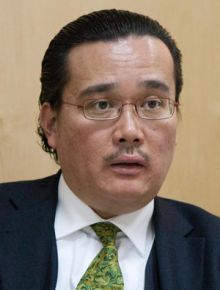Rene KANAYAMA, Chairman of the Board and Corporate Director, Japan Investment Advisory Council, has been in Ukraine for five years now. He knows this country and its problems quite well. Moreover, he said after the interview that the Ukrainian people can solve them.
While the world economy is in crisis, Japan is holding on in spite of the Fukushima accident. Could you explain what helped the Japanese economy resist the crisis? What kind of stability-ensuring resources has your country accumulated?
“The Japanese companies, which emerged on top of the world after World War II, began to diversify production as long ago as in the 1950s by placing their facilities abroad. It was at first in Germany, France, and the UK where we established new Japanese production centers, and in the early 1980s and especially 15 years ago we also began to increase our presence in Russia and South America, where we set up a very large number of such centers. They are all supplying nationally-made goods onto international markets today. Naturally, the Fukushima accident hit the businesses that work in Japan, but a large share of Japanese exports is being produced abroad, so the crisis did not affect Japan too much – we have a differentiated production sector.”
I can remember you saying that Japan takes a special attitude to EU and US sanctions against Iran. There are mixed reports on this point today. Will Japan finally support the oil embargo against this Muslim country or will it try to bypass it in some way?
“Japan has always pursued an independent policy towards Iran or Myanmar. I can say Japan does not always follow the policy of the world’s leading states and do what the US or other Western countries want. The current situation is as follows: if Japan stops importing Iranian oil, there are no guarantees at all on the part of the US or other countries that there will be no military conflict in Iran. Should the war break out, Japan may suffer because deliveries will be also discontinued from other countries, such as Kuwait and Saudi Arabia, through the Strait of Hormuz. Yet our government’s attitude is not yet finally clear. But it seems to us oil will continue to be supplied.”
As you said, Japan is going to shut down its nuclear power plants. Do you think this option can also be acceptable for Ukraine which, on the contrary, is going to build new nuclear power units?
“It is not simple at all for Japan to make this decision. There are three big companies that manufacture nuclear reactors. I would not say that these companies or the Japanese government are taking a dim view of the development of nuclear power generation in the world. We also know that some European countries, including Romania and France, have not renounced nuclear energy. But, as Japan will apparently be no longer developing nuclear power generation and building new reactors, these companies will inevitably take a look at foreign markets, where they will be able to carry out their projects and supply their reactors. Incidentally, post-Soviet countries, including Ukraine, have not phased out their nuclear programs either. I do not think you must necessarily follow Japan’s example in this matter if you take enough care of nuclear safety.”
And have you found a common language with our government, for Ukraine has major deposits of uranium? On the other hand, this country is beginning to build two nuclear reactors. Are there any agreements to be signed in this field?
“Last year Japan mulled over a very topical project of extracting nuclear fuel abroad, particularly in Ukraine. We held what we consider very informative and positive meetings with Ukraine’s Security and Defense Council officials, Enerhoatom top executives, and Khmelnytsky Nuclear Power Plant management. We are convinced it is possible to work and do successful business in Ukraine. It is known today, though, that Russian-made reactors will be installed in Khmelnytsky, but we were told there were still a lot of opportunities for Japan to supply other equipment for these power plants. We also discussed the assistance of Japanese companies in overcoming the consequences of the Chornobyl disaster and building new units at the Khmelnytsky plant.”
Does your country also show interest in foreign investments or is its economy developing now exclusively at its own resources’ expense?
“Japan has always been concerned about what to make its own investments in. And it has always intended to arouse the interest of other countries in, first of all, cutting-edge high technologies and in setting up research centers. Foreign companies have never come to Japan in order to establish their enterprises here. Yet some Japanese prefectures have some experience of attracting [foreign] investments to build the infrastructure of large sea- and airports. This served as a basis for launching such facilities as, for example, Toyota.”
You are working in our country now and obviously know our investment climate. Why, for example, are there no subsidiaries of Japanese automakers in Ukraine?
“We are not yet making our automobiles in Ukraine. But still 26 Japanese companies have already set up a number of local legal entities in your country and three or four companies are already busy producing things. One of them is helping you equip ‘Bohdan’ buses with Japanese engines. Our industrialists also take part in supplying components for these buses and the light-duty trucks produced by this firm. And, to answer your question, I would advise you to look at the map – you will see how many up-to-date enterprises Japan has already built in the countries around Ukraine. Among the centers of Japanese car making are Poland, the Czech Republic, Turkey, and Russia. But demand for automobiles on the world market dramatically fell in 2008-09. So it would be unwise to develop automobile production now. If the demand begins to rise, I can assure you that Japan will always consider Ukraine as an option for car making.”
Have any Japanese investment projects been implemented in Ukraine yet? Was it easy to advance them, were there any obstacles? And what real projects are in the pipeline?
“The Japan Investment Advisory Council has been in Ukraine since 2009 only. Still, high on the list of the businesses launched with the help of our country is such a major facility as Japan Tobacco International (Kremenchuk), one of the global leaders in this field. In western Ukraine, there is a large factory that makes electric cables. In our investment policy, we always take into account such advantages of Ukraine as geographical situation, access to the Black Sea, proximity to CIS countries, particularly Russia, and, what is more, to the European Union. But the conditions for developing various industries in Ukraine should meet the demand on the neighboring markets. I cannot tell you now about the planned projects because no documents have been signed yet. Besides, in the conditions of a global crisis, Japanese companies always take into account, above all, the level of demand for our goods and choose to invest in the countries where the population and, hence, the demand is on the rise. From this angle, you are seriously lagging behind such countries as China, India, Brazil, and other countries of South America.”
Your country has big experience in dealing with liquefied gas. Will the project of building an LNG terminal in Ukraine arouse the interest of Japan, its banks and major companies?
“You cited a very good example of possible cooperation. I think this can attract the technologies and financial resources of Japanese companies. As you know, Japan was one of the first countries to use imported gas. Almost all the gas that comes to our country is liquefied. So Japan is very interested in this project. We have the necessary expertise and know-how at our disposal and can take part in building this big facility. It is also possible to credit this project, for example, by Japan’s state-run International Development Bank. But in this case Ukraine must decide on the terms and conditions of our participation.
“If it is a strategic project for Ukraine, your government should, firstly, place it under a state guarantee. Otherwise, it will be very difficult to fund it. Secondly, it should be borne in mind that it is not a question of building one terminal only. One should take care of the whole chain – from the place where gas is extracted and delivered to the liquefaction terminal, to the methane-carrying tankers that will take the gas to the dissolution terminal, and to the study of demand for this fuel. As far as I can see, only two points are being considered now: feasibility report and sources of supply. It should be taken into account that the political factor plays a very important role in the import of gas by European markets. There is so much talk today about the intention of Azerbaijan to supply gas to Ukraine – and I believe this will occur. But this gas is being or planned to be supplied to many other areas, including Europe, there is also a demand for it in other regions. Therefore, Ukraine ought to have some alternatives to this project. And one should also think over the best way of delivering this gas to Ukraine. The point is there is a relatively short distance between Ukraine and Azerbaijan by sea, and many experts think it would be more advisable to build a pipeline. The world practice shows that such projects only become effective if the distance is over a thousand kilometers. But if the distance between Odesa or, say, Pivdenny Port and the liquefaction terminal somewhere in Georgia is not so long, there is an option of building a gas pipeline between the two countries.”
“Eastern European countries, which have quite successfully been attracting Japanese investments, have created a stable political structure. And the point is not only in who is in power today but also in who will be at the country’s helm five or ten years later. This political factor is not in the least responsible for the situation when Ukraine is short of heavy investments. But I would say that Ukraine is a country to which investments will never come. The experience of the Western companies that have already invested in Ukraine shows that it is possible to do business and build production facilities here. But, to tell the truth, the Japanese investor is very cautious. He looks into all the details of the investment climate and decides very slowly on whether or not to plunge in. But this is not the world practice: for example, US investors solve this problem very fast and only then map out the development strategy. We, Japanese, think it is better if the entire structure has been established and stable conditions have been created for work and the development of business.”








